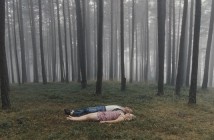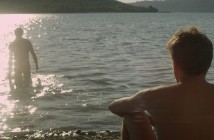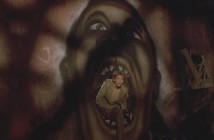
Editor’s Note: reviews this week are by Ronan Doyle and Daniel Tucker
January has never been the best of times for new releases; studio movies in particular have tended to be less-than-stellar when let loose upon us in the earliest parts of the year. If this week’s batch of Netflix releases is anything to go by—and that’s an open question—it’s equally true of indies here; the first 2014 offerings to hit the streaming service aren’t anything to write home about. It’s good, then, that we should have heavy-hitting holdovers from 2013, particularly in the form of two of the Oscar-nominated feature documentaries. As a flagship feature of Netflix Original Programming, The Square earns its own full review here.

+1
A drug dealer gets pissed because one of his customers didn’t invite him to a party. “I spent the afternoon at The Home Depot; those dudes really know their shit” is an actual line of dialogue. In what is basically Project X meets Chronicle, Dennis Iladis’s +1 is a surprisingly watchable but ultimately disappointing film. A film with a running time of 90 minutes has no business feeling like two hours. Interesting concept, pretty white people, and good-looking naked girls aside, +1 is an awesome concept ultimately not given the treatment we deserve. The film follows David (Rhys Wakefield) as he mistakes another girlfriend for his own girlfriend and ends up kissing her anyway. We then follow him to one of the weirdest parties ever put to television. Some supernatural activity creates clones of all the party attendees. Normally chaos would ensue, but the movie never reaches the brilliance it thinks it does because it would have worked better as a short. SO-SO. ~DT

And While We Were Here (Read our full review)
“…we wished we were somewhere else” is a continuation the fate-temptingly wistful title of Kat Coiro’s can’t but provoke once its navel-gazing narrative gets underway. Kate Bosworth plays Jane, a young married woman whose ailing relationship is put to the test when a teenage American expatriate she meets on an Italian vacation leads her to question her life with the aid of the disembodied voice of her late grandmother. That conceit is the movie’s most aggravatingly indie: she seeks to turn the recorded conversations with her forebear into a book documenting the old woman’s “unique” experience of living through both world wars; nevermind that she hasn’t experience, an angle, or anything apparent of interest to write. Such questionable scripting pervades And While We Were Here, which centres itself on a character so cold she’s impenetrable, even when a late-stage reveal make a last-ditch grasp for sympathy. It might have worked while we were still there. AVOID IT. ~RD

Bicycle Thieves
The veritable poster-child of Italian neorealism—the post-war wave that forged great cinema from rubbles and ruins—Vittorio de Sica’s Bicycle Thieves emphasises the enormous hardship faced by the country’s public in the wake of Mussolini’s fall, centring its bleak perspective on the difficulties of a working class father in securing stable employment. De Sica is a remarkable humanist, rendering this family’s tragic tale in melancholy low-key and economising narrative to accentuate emotion. He and co-writer Cesare Zavattini would go on to an arguably even more effective twist on this same sort of story in Umberto D.; that doesn’t preclude the lingering memory of Bicycle Thieves’ devastating finale, which ushers the palpable pain of all that came before to a heartbreaking embodiment of what the contemporary social situation really means for those struggling to survive. None will struggle to understand this film’s place in the annals of film history. HIGHLY RECOMMENDED. ~RD

Blindsided
It’s technically a spoiler to state that the cat Michael Keaton’s character gamely tosses from a New York penthouse balcony at one point in Blindsided manages to survive, but it’s the kind that indicative of how this dreary movie spoils itself by undoing the one out-there thing it manages to achieve. In that moment of mania Keaton almost salvages the lot; he’s on fine scenery-chomping form here as a home invader out to find some stashed diamonds, though David Loughery’s script never affords him the lines to really go wild. Director Joseph Ruben’s last movie, almost ten years ago, was the truly abysmal The Forgotten; he’ll do well to get another gig again after this witless show of tired thriller tropes. Michelle Monaghan’s performance as the homeowner, as well as lending the movie its atrocious title pun, offers one of the least convincing blind portrayals in recent memory. Unlike Ruben’s last, at least, in memory it won’t stay for long. AVOID IT. ~RD

Café de Flore (Read our full review)
How earnest a show of affectation is Café de Flore, Dallas Buyers Club director Jean-Marc Vallée’s mythical bipartite romance that uses its dual narrative strands as an-oft moving meditation on the transcendent power of love. Vanessa Paradis is immense as the young mother of a child with Down’s syndrome in the 1960s, ferociously protective of her son and keen to steer him away from the affections of a young girl. Far less interesting is the story’s other half, following Kevin Parent as a DJ divorcee in modern-day Montreal whose story succeeds only as a conduit to Vallée’s consistently strong use of music. How much the film succeeds in endearing the viewer to these characters is essential in selling a somewhat hokey finale; with the contemporary sequences as disposable as they are, the last act can’t but feel a little audacious. Still, there’s an admirable conviction at work here; a masterpiece Café de Flore is not, but by gosh how it tries. WORTH WATCHING. ~RD

Getting That Girl
Sighs of relief may greet the opening moments of Getting That Girl, which—stuffed as they are with silly stoner dialogue that plays as though it might have been guest-written by Kevin Smith—distance the film drastically from the kind of high-school romance its poster projects. Alas, by its end, you may find yourself pining for that level of college-bound cliché; Nathanael Coffman’s debut, released this year direct to DVD and VOD long after its 2011 premiere, takes some steps in the right direction before stumbling in the most gruesome of ways, subverting certain expectations its narrative might suggest before sliding headlong into a worse set of stereotypes of its own. Decent performances and a handful of effective comic lines work well toward excusing the film from the odiousness into which it can occasionally slip; it’s never for more than a moment that things are on track, though: the movie’s eventual achievement is in never being as bad as it threatens to become. AVOID IT. ~RD

Run
Anyone who’s seen the balls-to-the-wall French action film Banlieue 13—sometimes ludicrously re-titled District B13—knows just how much mad fun parkour can be on film. That movie had the arguably unfair advantage of starring founder David Belle, which gives it an obvious edge over a film like Run. But this movie, the solo directorial debut of Simone Bartesaghi, fails not merely for the comparative modesty of its free running stunt work: the story here is a terrible mess, a hodge-podge of teen misfit stereotypes and a ludicrous thriller framework that gives Eric Roberts an excuse to arrive and ham it up for a scene or two. His wine-swilling villain is about as far removed from Hans Gruber as can be while still so clearly trying to ape him; it’s appropriate, in a sense, of a movie that tries to twist generic action with so little of difference to offer. AVOID IT. ~RD

The Act of Killing (Read our full review)
Great care, of course, has to be taken in proclaiming any relatively new film as one for the ages, but it’s difficult to think of The Act of Killing as anything less than revolutionary in its approach to documentary cinema. Uncovering the terrifying stories of gangster assassins hailed as heroes in their native Indonesia for their mass murder of suspected communists, director Joshua Oppenheimer allows his self-satisfied subjects to recreate their crimes in an array of increasingly expressionistic filmed scenes, which gradually give way to a realisation of reality through fantastical abstraction. It’s as much a strange commentary on the screen’s power over us as it is an examination of a buried genocide; Oppenheimer’s film is of course a harrowing revelation of this terrible legacy, but it’s also a profoundly strange (ab)use of the peculiar qualities of cinema to teach us the lessons lived experience cannot. As much in effect as in content, this is a film unlike any other. MUST SEE. ~RD

The Bubble
Director of last year’s sadly underseen Yossi (also available to stream together with Yossi & Jagger, to which it’s a sequel), Eytan Fox melded his tender romantic tendencies with a more pronounced political point in The Bubble, the tale of a gay Israeli-Palestinian relationship loaded with cultural and personal difficulties. Fox’s great strength is in the construction of his characters, ensuring we fall for them in much the same way as they do for each other; he has a talent for sex scenes like few others, giving physical visualisation to the emotional undercurrents his actors so excellently evince. He finds mixed success in exploiting the fruits of this labour to a thematic end: as successful as the central relationship is, it’s strained by an overlong ending that slightly sacrifices the grounded realism in which the film formerly traded. Still, it’s an appreciable point he makes here, melding personal and political: The Bubble is a beautiful film, flaws and all. RECOMMENDED. ~RD

Toad Road
Jason Banker’s debut starts to make a whole lot of sense, inasmuch as sense can be made of it, when one examines the list of films on which he’s credited as cinematographer. Having shot movies by and about figures like Jonas Mekas and Jonathan Caouette, it’s easy to understand why Banker should adopt so avant-garde an aesthetic approach. Having also shot the comparatively calm Allen-esque comedy Richard’s Wedding, it’s not hard to understand how he might have thought to mingle his experimental approach with group comedy antics. The result is a mess, frankly, but never not an interesting one: only in its final act do the more horror-oriented aspects of this drug culture commentary have the intended effect, yet it’s one almost stark enough to save the lot in retrospect. Clearly Banker has a good deal of talent to share; Toad Road is, at least, a step in the right direction to realising that. SO-SO. ~RD



